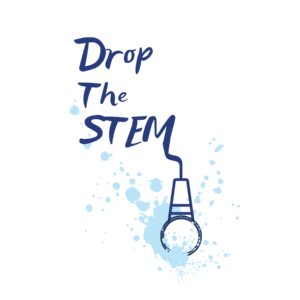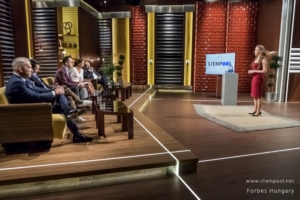Starting a podcast – experience and tips from Blanka of Drop the STEM
A science podcast not only about the results of the research but mostly about the process of research – this is what makes Drop the STEM unique. Elizabeth from Crastina reached out to its founder, Blanka Novák from Hungary, to hear more about her journey as a science communicator.
Meet Blanka Novák, she has topped the international competitions EUCYS 2018 and ISEF 2019 and participated in Stockholm International Youth Science Seminar 2018, sweeping prizes and forming meaningful relationships with like-minded scientists. These experiences led her to inaugurate a podcast that will showcase the bright minds behind today’s cutting-edge research. Nowadays, she is a full-time biological science undergraduate student and an entrepreneur forming cross-continent partnerships and featured in Hungary’s Shark Tank and Forbes.
Hi Blanka! A pleasure to have you with us. Do you remember your first exposure to a not classic classroom-taught way of science communication?
It was when I was a first-grader. I was telling my mom that I didn’t understand the material displayed in science class, so she presented nature as a fairy tale of life, explaining the process of flower pollination adorned with cute bees and flowers. I think that is the way science should be communicated: similarly to our digestive system, the macromolecules have to be broken down into digestible, understandable pieces.
What was your first experience communicating science?
During my first science fair on a national level, I portrayed a green skin condition with the face of Yoda master from Star Wars before numerous distinct professors. Some enjoyed it, others not so much. From that experience, I learned to tailor your message to your audience and not necessarily bombard people with puns when you should accentuate your more professional side.

Do you remember the “a-ha” moment when you decided to inaugurate a podcast?
Well, there were three different milestones involved in developing the idea to inaugurate a podcast.
The first was the international science fair EUCYS (EU Contest for Young Scientists) in 2018, where I felt like I was truly understood for the first time. All the contestants shared the same passion for science: you all go through the ups and downs of research, and we could connect on a deep level by sharing these experiences, too.
The second milestone was SIYSS 2018 (Stockholm International Youth Science Seminar). At the Nobel Reception, we met Dr Tasuku Honjo, the Laureate in Physiology or Medicine, who was expanding on the importance of women in science, how scientific communication and giving back to the community is imperative. I received a lot of bits of wisdom that stuck with me until this day.
The third most pivotal moment was ISEF 2019 (International Science and Engineering Fair), during which I noticed that something so magical happens when minds with a similar enthusiasm for science and concerns for our future are connected. A few days after I landed back home, I jotted down a few names that boiled down to Drop the STEM, inspired by the move of dropping the mic.
“Innovation is putting the already given puzzle pieces in a unique order.”
How did you decide on the group of people you would interview?
First and foremost, having professional achievements that lay a foundation for their credibility is essential. On top of that, I focus on showing all the aspects of science that can be involved in research or be related to experimental discoveries. Most importantly, they are passionate about communicating science, since this podcast offers that environment for them to reach people thousands of miles away by sharing inspiration and giving back to others. Whenever we get to the question “what does science mean to you?”, the answers are almost always people-connected: a spirit of giving characterizes them.
Your background is biochemistry, microbiology and pharmaceutical science. How do you help to bridge the gap between these experts to yourself, to the audience?
I think that placing myself in the position of the audience helps to bridge the gap and create empathy. I bring that whimsical curiosity and consider the questions that might pop up in the head of the listeners. Digging deeper is essential and almost all science and innovations have some impact on our lives that could be highlighted. When focusing on the more humane aspect it can be absorbed and grabbed by the audience, forging mind-to-mind and heart-to-heart links.
What lesson from research do you implement in science communication, and vice-versa?
Research allows for flexibility and the element of surprise when you get results that you did not expect in your hypothesis. The same can be translated into scientific communication: even though we might have a perception of a person, excitement derives from being surprised and discovering unknown parts about them.
Do you want to share a funny or awkward story from your experience with Drop the STEM?
Yes! I have one that really stuck with me. For the podcast, I use a platform that sets up a link for your guests, and as usual, I set it for the upcoming episode to my computer, then went to sleep. At 5 am, I heard some sounds, and half asleep, I was trying to figure out where the voice was coming from. I opened the computer, started listening, and I realized that my upcoming guest was singing while having the platform’s tab open! In fact, we are great friends and it is also always fun to remember the time when she was unknowingly giving us a singing concert.
[If you want to hear more about the story, check out Episode 24!].
What do podcasts mean to you, and which ones would you recommend?
I think that podcasts are especially beneficial because they can be incorporated into your life and thus you feel like you are part of the conversation, sort of like eavesdropping, having more personal contact. I enjoy listening to them while getting ready in the morning: that is how I get my food for thought.
| Two of Blanka’s favourite podcasts
Brain Stuff from iHeartRadio. https://www.iheart.com/content/about-brainstuff/ Dream Big Podcast by Bob Goff. https://dreambigframework.com/podcast |
How do you manage to successfully combine all your activities while being a full-time undergraduate student?
Firstly, an optimistic attitude is vital, which should not be mixed with or deemed equal to being positive, because optimism doesn’t deny but rather addresses the current situation and issues and seeks to bring improvement.
It is essential to recognize that you cannot do it all at once, you have to compartmentalize. There is a concept in startups called the MVP, the minimum viable product. I think perfection is not carved into stone, and we continually have to change and adapt. Lastly, don’t pretend to show that you’ve got it all.
If you were the minister of Education in Hungary, what law would you introduce?
I would introduce a law to go outside of the classroom, especially when learning a new subject: a proposal for immersion. Being an active member of the learning experience is proven to be beneficial to the understanding of new material.
For example, when you’re studying biology, venture out for a field trip and then incorporate the scientific concepts. Or, if you’re learning a language, take a walk in your local town and present the city as a tour guide.
Finally, do you have advice for starting a podcast about science?
In our ever-digital world, we are always on the go, speaking and buzzing, I would encourage someone starting the podcast to listen attentively and carefully to their guests. I see a difference between listening with the intent to reply or to understand, which makes a noticeable difference.
Another advice would be to find the void that has to be filled, your unique niche that hasn’t been given attention before. One quote that I savour is – “Failing in originality is better than succeeding in imitation”. So, find the thing that you’re passionate about and bring in that innovation factor. When you allow yourself to think outside the box, you can bring forth marvellous ideas, and I just encourage everyone to tap into their unique genetic blueprint and aspirations.

| Recently, Blanka has inaugurated STEMPOOL, a platform for scientific match-making. Scientists, organizations and institutions are encouraged to register and find their next collaboration partners from across the globe! https://www.stempool.net/
Blanka is also a co-founder of SynthEthics, a global group who would like to investigate the path towards prosperous biotechnology, investigating the ethical implications of biotechnological projects and getting deep into the grey area zones of philosophy and ethics. You can find more information about Blanka’s research, podcast, STEMPOOL and SynthEthics in the links below: |
- Dr. Elisabeth Bik vs. Scientific Misconduct - October 14, 2020
- Starting a podcast – experience and tips from Blanka of Drop the STEM - July 28, 2020





Leave a Reply
Want to join the discussion?Feel free to contribute!